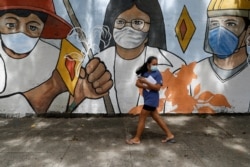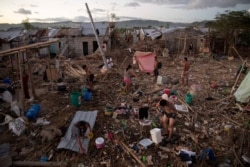Child prostitution is surging this year in the Philippines, where parents have lost jobs during strict anti-pandemic shutdowns and allowed their children to work the sex trade, often through online connections, activists and officials say.
Officials in the Southeast Asian country believe COVID-19 is fueling an increase in online sexual exploitation of children, the government's Commission on Human Rights said in September. UNICEF had already described the Philippines four years ago as “the global epicenter of the live-stream sexual abuse trade.”
International advocacy group End Child Prostitution and Trafficking estimates a 264% increase in online sexual abuse and exploitation of children during the pandemic, the domestic news website Manila Bulletin reports.
“The increasing cases of children in prostitution is alarming,” said Maria Teresa Dela Rosa, president of the National Association of Social Work Education advocacy group in the southern city Davao.
“Parents, out of poverty, are pimping their children, even using the online platforms,” she said.
Stay-home orders enforced at the neighborhood level since April have made it tough for adults to keep or find jobs. The Philippine jobless rate was 10% in July, up from 5.4% a year earlier.
Child prostitution is happening largely at home, often involving fathers, stepfathers, uncles or older brothers, Dela Rosa said. Now adults in the family are helping their children use the internet to set up paid sex with people from outside the home, a source of family income, she said. The internet’s prevalence facilitates advertising, finding customers and getting paid, she added.
The Philippines is the largest known source of online sexual exploitation of children, the ASEAN Post, a news and data website covering Southeast Asia, said in an October report.
Dela Rosa cited one reported case where a father found a customer for his 7-year-old boy for the equivalent of a few U.S. dollars and described a 9-year-old girl who was selling sex to taxi drivers.
Quarantined online sex offenders are spending more time online, since it’s more difficult to go out, the commission’s statement says. “Vulnerable” women and children are “confined at home” at the same time with their traffickers, it says.
About 1 in 5 Filipinos lives in poverty. In urban slums without lockdowns, children can normally go outside to sell sundries from street corners or panhandle for change. Some of the poor live in mountain villages that rely on subsistence farming.
The country’s regular typhoons, earthquakes and volcanic explosions along with COVID-19 have made poverty more acute, pushing children toward prostitution, experts believe.
“This normally happens when we have disasters and now with the pandemic with many people losing jobs,” said Maria Ela Atienza, political science professor at the University of the Philippines Diliman. “Even the children are sacrificed in the process,” she said.
Lory Pabunag remembers the struggle to leave prostitution, her work of eight years. She did it to give “respect” to her three children, now ages 13, 23 and 26. A lot of people leave only when local nonprofit groups arrange other work for them, but those jobs are temporary, she said.
Mothers and children in prostitution are answering pressure to provide for family, she said.
“Being poor and being vulnerable is very risky and very hard, especially for women and especially for children who want to finish studies and wanted to go to school and wanted to help the family,” said Pabunag, 45, who now works for an anti-prostitution, anti-trafficking aid group in the southern Philippines.
Philippine officials must step up enforcement against child prostitution, said Dela Rosa, also a social worker and on the faculty of Ateneo de Davao University. They do too little now to stop online pornography, a vehicle for child prostitution, she said.
Government stimulus spending to ease economic shocks from the pandemic doesn’t go far enough for families, especially those who suddenly need to buy laptops for online schooling, Dela Rosa added. The country approved about $4 billion in stimulus earlier in the year.
To help further, the Philippine Senate is reviewing a bill that would require internet service providers and tourism establishments to report child prostitution crimes.
The human rights commission acknowledges that the crime is now hard to police. “The challenge remains for us to protect the most vulnerable individuals while swiftly prosecuting their abusers,” its September statement says.
“The lack of [child prostitution] data, the inconsistency in data collection, sharing and analysis across agencies, and the complexity of internet-facilitated crimes has made it almost impossible to accurately capture the extent of the crime locally and globally,” the commission says.






